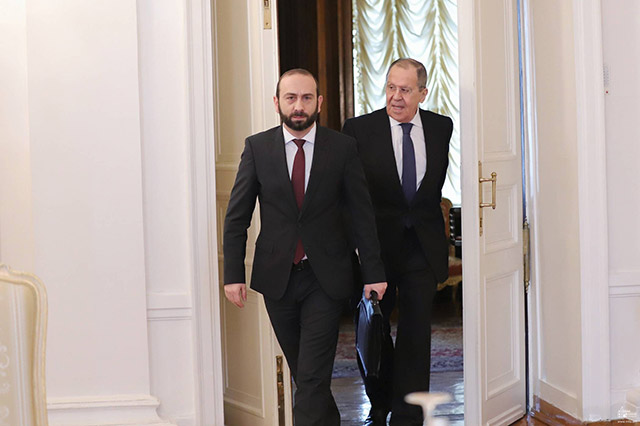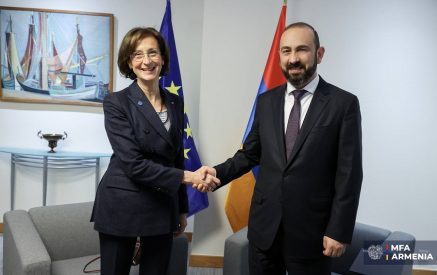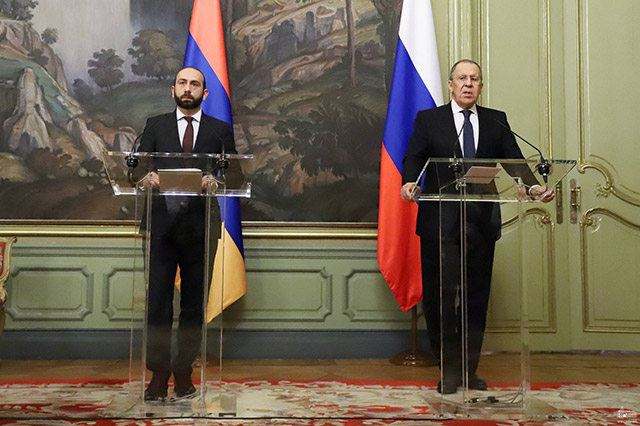Аzatutyun.am. Russia on Friday accused Western powers of seeking to sideline it, hijack Armenian-Azerbaijani peace talks and use the Nagorno-Karabakh conflict in their standoff with Moscow over Ukraine.
Russian Foreign Minister Sergei Lavrov said that the United States and France have stopped working with Russia within the framework of the OSCE Minsk Group that has long been co-headed by the three mediating nations.
Lavrov also hit out at the European Union, saying that it is trying to claim credit for Armenian-Azerbaijani agreements that were brokered by Moscow after the 2020 war in Nagorno-Karabakh.
“In a Russophobic frenzy, our American and French ‘partners’ … have cancelled the co-chairing troika of the OSCE Minsk Group,” he said after talks with Armenia’s visiting Foreign Minister Ararat Mirzoyan. “They have said that they will not be communicating with us in this format.”
Read also
“If they are ready to sacrifice the interests — in this case of the Armenian side — of settlement in Nagorno-Karabakh and the South Caucasus as a whole, it’s their choice,” he told a joint news conference.
Mirzoyan questioned this claim, saying Yerevan has received “very clear signals” from the U.S. and France that they remain committed to the Minsk Group. “This is very encouraging,” he said.
Lavrov went on to lambaste European Council President Charles Michel for his failure to mention Russia’s role in his statement on his trilateral meeting with Armenian Prime Minister Nikol Pashinian and Azerbaijani President Ilham Aliyev held in Brussels on Wednesday.
“This indicates what is more important for the EU leadership: to build on what has been achieved or to use the Karabakh theme to ‘mark’ itself along its Russophobic line,” he said. “This is sad. Russia will never sacrifice the interests of our closest allies to some geopolitical, propaganda plans or games.”
Michel said after the Brussels talks that Aliyev and Pashinian agreed to start drafting a comprehensive peace accord and to set up a commission tasked with demarcating the Armenian-Azerbaijani border. He also reaffirmed the EU’s readiness to facilitate the opening of transport links and other confidence-building measures between the two South Caucasus states.
Lavrov stressed that Russian President Vladimir Putin had already laid the groundwork for these agreements during his frequent contacts with the Armenian and Azerbaijani leaders. In particular, he argued that the latter pledged to create a commission on border demarcation at their November 2021 meeting with Putin held in Sochi.
“We and our colleagues confirmed today that the decision of the leaders of Russia, Armenia and Azerbaijan that the delimitation commission will be bilateral with the consultative participation of the Russian side remains in force,” added Lavrov.
A senior EU diplomat insisted earlier on Friday that the EU and Russian efforts to end the Karabakh conflict are “not mutually incompatible.” The diplomat also told RFE/RL’s Armenian Service that Michel gave credit to Moscow by referring to the Russian-brokered ceasefire that stopped the six-week war in November 2020.
Lavrov further announced that a Russian-Armenian-Azerbaijani intergovernmental body dealing with practical modalities of reopening regional transport links will meet later this month after a four-month hiatus. He said Moscow is also ready to help Yerevan and Baku “create conditions” for concluding the peace treaty.
“We talked [with Mirzoyan] in detail about how we can help our neighbors start this process,” he said.
In a further sign that Moscow wants to wrest back the initiative in the Armenian-Azerbaijani peace process, Lavrov phoned his Azerbaijani counterpart Jeyhun Bayramov after the talks with Mirzoyan. According to the Russian Foreign Ministry, they discussed the possible peace treaty, the creation of the commission on border demarcation and renewed activities of the Russian-Armenian-Azerbaijani task force.

























































